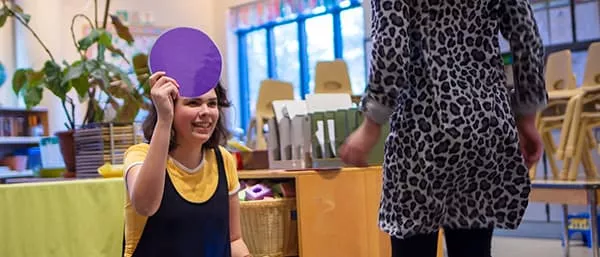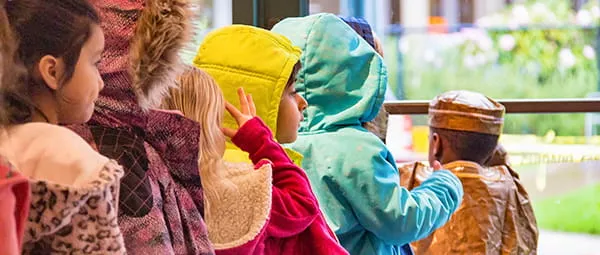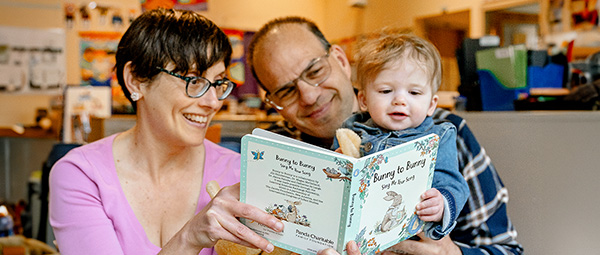Early Childhood
Research Core
Hallie E. Ford Center
Faculty in this core focus on optimizing children's development and well-being in families, early care and educational settings and communities.
Current projects in the early childhood research core

Early learning System Initiative (ELSI)
Developed and designed to increase early access to high-quality, professional learning opportunities and technical assistance for the early education workforce in Oregon.
- Director: Megan McClelland, PhD
- Coaching Core Lead: Bridget Hatfield, PhD
- Training Core Lead: Alexis Tracy, MS
- Data Core: Irem Korucu, PhD and Chris Gonzales, PhD

Oregon Inclusion Initiative
Developing a framework of support to implement the Pyramid Model and the National indicators of high Quality Inclusion in Oregon early care and education environments. The ultimate goal is to contribute to the creation of an inclusive, culturally responsive, and identity affirming early care and education workforce.
- PI: Bridget Hatfield, PhD
- Co-PI: Megan McClelland, PhD

ASPIRE Children’s Environmental Health Center
A dedicated team working together to improve children's health and well-being. Their efforts focus on accelerating the adoption of evidence-informed policies, programs, and practices that can reduce harmful environmental exposures where children live, play, and attend school.
- Director: Molly Kile, ScD
- Deputy Director: Megan McClelland, PhD

Red Light, Purple Light! Evaluating a Self-Regulation Intervention for Children in Early Learning Settings
This project will test the initial efficacy of Red Light, Purple Light (RLPL), a self-regulation intervention developed as part of an Institute of Education Sciences (IES) grant. Researchers will examine whether access to one of two versions of RLPL, self-regulation (SR) or self-regulation with math/literacy (SR+), compared to a wait-list control (WLC) condition, relates to gains in children's self-regulation, math, and literacy skills in preschool and six months later.
- PI: Megan McClelland, PhD
- Co-PIs: Shauna Tominey, PhD, Sarah Schmitt, PhD, and John Geldhof, PhD

Roots of Resilience
Roots of Resilience is a professional development program to help early childhood teachers promote resilience with children impacted by trauma. Early childhood trauma poses a serious threat to the well-being of children, families, and communities. With the majority of children attending early care and education prior to kindergarten, the opportunity to help them start school ready to succeed is profound.

Flame Retardants and Home Environment on Children's School Readiness
This interdisciplinary study aims to improve our understanding of children's exposures to flame retardant compounds, as well as to examine the interplay between flame retardants and adverse social experiences on children's neurocognitive, executive functioning, and behavioral development.
- Co-PIs: Shannon Lipscomb, PhD and Molly Kile, ScD
- Co-Investigators: Megan McClelland, PhD and Megan MacDonald, PhD

Oregon Child Care Research Partnership
The Oregon Child Care Research Partnership brings together state child care agencies, child care resource and referral entities, child care practitioners, and university-based researchers to define, create, and disseminate research on child care dynamics to decision-makers.
- PI: Megan Pratt, PhD

Impact of 2014 CCDBG Act on Children, Families, and the Quality of Home Based Child Care
This project implements four research studies to assess the effect of Oregon's implementation of new policies in response to the Child Care and Development Block Grant (CCDBG) Act of 2014, with a special focus on home-based child care.
- Co-PIs: Megan Pratt, PhD and Bridget Hatfield, PhD

Development and evaluation of an intervention to increase joint activity and social well-being for adolescents with developmental disabilities
This research project is evaluating a multi-site, novel physical activity intervention for adolescents with developmental disabilities and their family dogs through a multi-site randomized controlled trial.
- PI's: Megan MacDonald, PhD and Monique Udell, PhD
Stories and articles on core research and programs
Jan. 25, 2024
Board book promotes healthy beginnings
Nov. 21, 2023
How do instructional coaches prepare to effectively support early childhood educators?
Jan. 24, 2023
ELSI: Oregon’s Higher Education Partner for Early Education
Dec. 27, 2022
A New Year of Reflection, Impact and Equity
May 24, 2022
Five Tips for Talking With Kids About What’s Going On in the World
March 16, 2022
OSU receives $14.4 million grant for statewide center to support early childhood educators
Past projects in the early childhood research core
Measuring Resilience to support collective impact with TRACEs (Trauma, Resilience, and Adverse Childhood Experiences) of Central Oregon.
Through a partnership between TRACEs of Central Oregon, OSU-Cascades, and Better Together of the High Desert Education Service District, this project has launched a shared measurement of resilience throughout Central Oregon.
The goals are to use these shared measures to understand our communities, continuously improve conditions to nurture resilience, track progress, and celebrate successes.
Enhancing Child Development Through a university-library partnership: Evaluation of Books Can…
Using a randomized control trial (RCT) study design, this project is evaluating the effectiveness of Books Can...©, an interactive parent-child program developed by public libraries. The program is designed to support the social and emotional development of preschoolers.
The impacts are being evaluated in terms of changes in parent knowledge, changes in parent perceptions of libraries, changes in parent behavior, children's self-regulation development, and children's language development.
- Co-PI: Megan Pratt, PhD
The Oregon Earned Income Credit's Impact on Poverty in Early Childhood
Oregon's refundable earned income tax credit (OEIC) is equal to 8% of the Federal Earned Income Tax Credit (EITC). In 2017, Oregon introduced a unique supplement to the OEIC that provided an additional 3% of the Federal EITC to families with children under the age of 4.
This project uses Current Population Survey data to estimate the impact of the OEIC, including the supplement for families with young children, on poverty among children and young children.
• CO-PIs: David Rothwell, PhD and Bruce Weber, PhD
Developing a Measure of Self-Regulation for Children at Risk for School Difficulty
This four-year project will revise an existing measure of self-regulation, the Head-Toes-Knees-Shoulders (HTKS) task, for use as a school readiness screening tool for children from at-risk backgrounds.
The existing HTKS is a predictor of school achievement for diverse groups of children. However, English language learners (ELLs) and children from low-income backgrounds have not performed well on this measure.
The research team will develop and validate a revised version of the HTKS measure to more accurately assess the self-regulation skills of preschoolers who are at risk.
Using Technology to Promote Executive Function in Young Children
The research team will develop a mobile app to facilitate the delivery of games and activities that have been developed to help children practice how to stop, think, and then act.
These previously developed games and activities have been shown to be effective in two randomized control trials. They were designed to promote self-regulation skills in young children.
Evaluation of a Mind in the Making-based Intervention Targeting 4-year-old Children
The primary aim of this project is to assess the impact of a Mind in the Making (MITM)-based intervention that targets teachers, preschool-age children, and parents. The intervention is designed to promote the healthy development of children's executive function skills.
Participating teachers and parents will receive training in the Seven Essential Skills Modules from MITM and circle time games (Tominey & McClelland, 2011).





